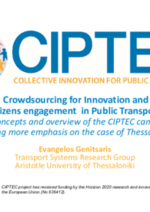CIPTEC
Using the collective innovation and intelligence of the crowd to improve public transport

About the project
CIPTEC sought to increase the modal share of public transport (PT) by being able to better understand and attract new users at as low a cost as possible. It sought to do so by developing and utilising modern marketing techniques, and promoting creativity and innovation to encourage the desired modal shift. Two main processes sat behind this:
- Market research of user groups
- Collective innovation
CIPTEC also examined PT from the supply perspective, shedding light on the challenges faced by PT providers. To tackle these, it produced the CIPTEC Toolbox for Public Transport Innovation. This helped operators and policymakers understand their situation, identify applicable solutions, and implement these.
Market research of user groups looked to ascertain what constitutes a good PT offer, such as the services to include, whom to target, and how to promote it. This revealed seven ‘hidden’ user groups (more details here) who have different public transport requirements.
Introducing complementary packages of innovations can have a multiplier effect on increasing PT’s modal share when measures are chosen in order to fulfil identified user needs. This is far more effective than introducing measures assumed to be the right ones.
Collective innovation: ideas were gathered and chosen via crowdsourcing and co-creation workshops. CIPTEC developed an online platform used in five campaigns.
These were held in Frankfurt (Germany), Rotterdam (the Netherlands), Southern Tuscany (Italy), and Thessaloniki (Greece), with one also Europe wide. In total, 486 ideas were submitted and 8863 users visited the campaign websites. An open source version of the platform is available.
Find more in-depth information on the lessons learned in CIPTEC on p.16 - p.18 of the publication CIVITAS Research Projects - Lessons Learned - 2015-2018.
Cities
Fast Facts
May 2015 - April 2018
Project duration
11 participants
Project partners
€ 3,498,350
Project funding















